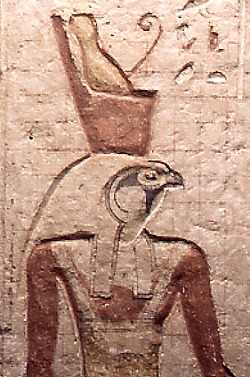
Greek name for the Egyptian god 'Her-wer', which means 'Great Horus' or 'Horus the Elder'. Originally there were several gods called Horus (which means 'the far-away one') in Egyptian mythology. One of them was one of the five children of the sky goddess Nut and thus the tenth member of the Ennead of Heliopolis. He was born immediately after Osiris on the second of the five epagomenal days added to the year. Then there was also the god Horus, the son of Osiris and Isis (thus the fifth generation in the genealogy of Heliopolis). To differentiate between them, and to ensure that these different gods did not lose their individual identities, the latter was called Harsiëse (in Egyptian 'Her-sa-Aset', Horus the son of Isis) and the name Horus the Elder was used for the god who was actually his uncle. The gods usually called the Sons of Horus (Amset, Hepi, Duamutef and Qebehsenuf) were the children of Haroeris and Isis.
Haroeris is the sky god whose eyes are the sun and the moon. In various myths, however, he is also identified with the sun god, or functions as his son. This latter step resulted in him being identified with Shu. Thus Haroeris is also involved in the myth concerning the distant eye of the sun god, which he brings back from a far-off land. In some versions Tefnut is this eye. Because Haroeris was sometimes regarded as the sky god himself, whose eye was the sun, and then again as his son, there are not only versions of the myth in which he takes possession of the eye himself but also some in which he gives it back to its original owner. The particular way in which the Egyptians regarded their world meant that they saw no contradiction in this.